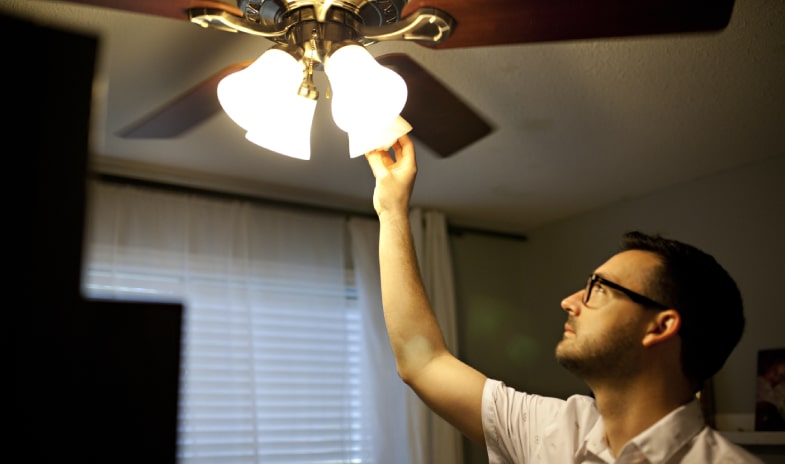When you start asking the question “Why are the lights flickering in my house?” you may feel like you’ve been watching too many horror movies. But concern about blinking lights in your home is not paranoia. A flashing bulb often signal a problem with your electrical system, which can require urgent attention to avoid the danger of electrocution or electrical fires.
Use the following list to troubleshoot why your lights are flickering and what action you should take to repair your light fixtures.
Need an electrical inspection? Learn about what’s included in an electrical inspection checklist.
1. Loose Light Bulb
Light bulbs that are loose in their sockets will receive an inconsistent supply of power, which can cause a flickering effect. This problem has a simple fix: Turn off the light. If it is equipped with an incandescent or CFL light bulb, wait for the bulb to cool down before handling it. Then gently tighten the bulb in its socket before switching your light fixture or lamp back on.
2. Type Of Light Bulb
Speaking of light bulbs, the flickering may be a result of the type of bulb that you are using. Should this be the case, your flickering light syndrome is harmless and easy to solve.
For instance, fluorescent light bulbs tend to flicker when the room is cold (typical on a Calgary winter day), or while the lights are powering up. If you find this annoying, consider replacing your fluorescents with a different type of bulb.
Another example is fluorescent or LED light bulbs being used with non-compatible dimmers. LED bulb flickers if you use them with conventional dimmer switches, which are designed for incandescent or halogen bulbs. It’s important you’re using the right type of dimmers. To solve this problem dimmable LED bulbs and compatible LED dimmers must be installed.
3. Circuit Overload
Do your lights sometimes start flickering when you turn on an appliance, such as your dishwasher or microwave? If so, then you might have an overloaded circuit, due to the larger amounts of electrical current which these appliances draw as they startup.
Infrequent, brief flickering is usually not serious, but if you find that the problem occurs all the time or lasts more than a few seconds, you may need to upgrade or install new electrical circuits in these areas.
4. Voltage Change
Though your home’s electrical voltage can fluctuate slightly, it should always fall within the range of 115 to 125 volts. Voltage change outside this range is problematic and should be diagnosed by a professional electrician.
Signs of severe voltage fluctuation include:
- lights flickering or dimming when you switch on large appliances
- flickering continues even after you have turned the appliance off
- light switch dim at unexpected times
- light bulbs burn out more quickly than normal
- appliances or electronics shutting off or malfunctioning
5. Loose Wiring
Is your light flicker problem getting steadily worse — for no apparent reason? Loose wiring could be at fault, whether it is due to wear and tear, outdated wiring, or incorrect installation. This is an electrical problem that you must take very seriously.
A loose connection anywhere within the system is a fire hazard, as it is liable to cause arcing or overheating. Don’t risk a devastating electrical fire or complete loss of power in your home – call for electrical service as quickly as possible. You may also have aluminum wiring in your home – which needs replacing.
Keep Your Home Safe From Electrical Hazards
If you are concerned about the lights flickering in your home, contact Sun Electrical. Our friendly, fully qualified team will answer all your questions and explain your options for expert electrical troubleshooting, repair, or upgrades. We’ll explain all the costs involved upfront so you will have no surprises when the work is done.
Contact us for a fast, no-obligation quote. Dial 403-214-8888 for 24/7 Calgary-area emergency service.





